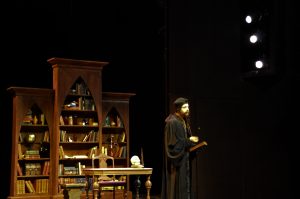
Concordia Theatre’s first mainstage production of the year reforms the way history is told through a comical interpretation of the lives of Martin Luther, Doctor John Faustus, and Prince Hamlet.
“Wittenberg,” written by David Davalos, tells the story of these three unrelated historical and fictional figures meeting for the first time at a university in Wittenberg, Germany. The play opened on Sept. 27 and will run through Oct. 1 with showtimes at 8 p.m. from Wednesday through Friday and at 2 p.m. on weekends. Thursday evening is a special performance for members of Trinity Lutheran Church, who can attend free of charge with a ticket from the church office. The Trinity Foundation is working in conjunction with Concordia for the first time, as they are sponsoring the production.
“Wittenberg” is set in October 1517 at the University of Wittenberg, where the students and faculty are settling into the fall semester. Hamlet is entering his senior year of college and is still undecided on a major. A star of the tennis team, his game begins to suffer when he starts experiencing hallucinations.
Junior Joshua Palmquist, who plays the role of Hamlet, has learned a lot about himself through his character.
“Hamlet is every college student that has a moment of, ‘What am I going to do with my life?’ He’s trying to figure out who he wants to be and what he believes in, which is very relatable to the college experience,” Palmquist said.
Two professors, Faustus and Luther, act as mentors for Hamlet, offering polarizing views of mortality. Faustus, a philosophy professor at the University played by freshman Nicholas Schons, is known as a daring free-thinker, while professor Luther, played by sophomore Alex Stokes, is known for his devotion to the church.
Concordia professor Christian Boy, who is directing “Wittenberg,” explained Davalos’ motives for choosing the characters and adjusting the historical timeline.
“[Davalos] shifts the storyline so we are at the penultimate moment for each of the three characters,” said Boy.
Another actor emerges throughout the plot, shape-shifting herself into the roles of Gretchen the barmaid, Helen of Troy, and the Virgin Mary. Played by Concordia sophomore Dorothy Alexiuk, she represents the philosophical and ideological concept of the eternal feminine, embodying the omnipresent essence of femininity that cannot be changed.
“Wittenberg” is laden with theological and philosophical concepts, but those involved with the show believe that the humor is accessible for all audiences: Lutheran, Faustian, or Shakespearean scholars, those who have a basic historical understanding of the characters, and even those who do not.
“You don’t have to be a scholar to love this play and find it funny,” Boy said. “There are a lot of hilarious interactions between these characters that everyone will enjoy.”
Concordia’s own Luther scholar, Dr. Roy Hammerling, found the play to be equally as hilarious as it is historically accurate. Hammerling was asked to speak to the cast to give some background information about Luther’s life and to validate the historical references and dialogue within the play. He concluded that Davalos knows Luther well, and his script is often directly quoting the words and monologues of Martin Luther.
“I think people will enjoy the play. It’s very smart. It’s very funny. At times it’s audacious. It may offend some, and that’s part of what plays do, but I highly recommend it,” Hammerling said.
Boy has been looking forward to doing the show in commemoration of the 500th anniversary of the Reformation for a few years. In conjunction with this year’s Symposium, Boy hopes to bring new light to the life of Martin Luther.
“Martin Luther was funny. As an Augustinian monk, Luther was earthy, coarse, and human. He was not some lofty, aloof, unapproachable theological scholar. He was connected to his body and to human needs, and he’s hilarious. It’s a big surprise to people,” Boy said.
Students, alumni, faculty, and staff at Concordia receive one free ticket for the run of the show. The cost is $10 for adults and $5 for senior citizens and other students. Tickets can be bought or reserved at the Frances Frazier Comstock Theatre Box Office on Tuesdays through Thursdays from 12 p.m. until 4 p.m. The Box Office can be reached at thrtix@cord.edu or at (218) 299-3314 as well.

